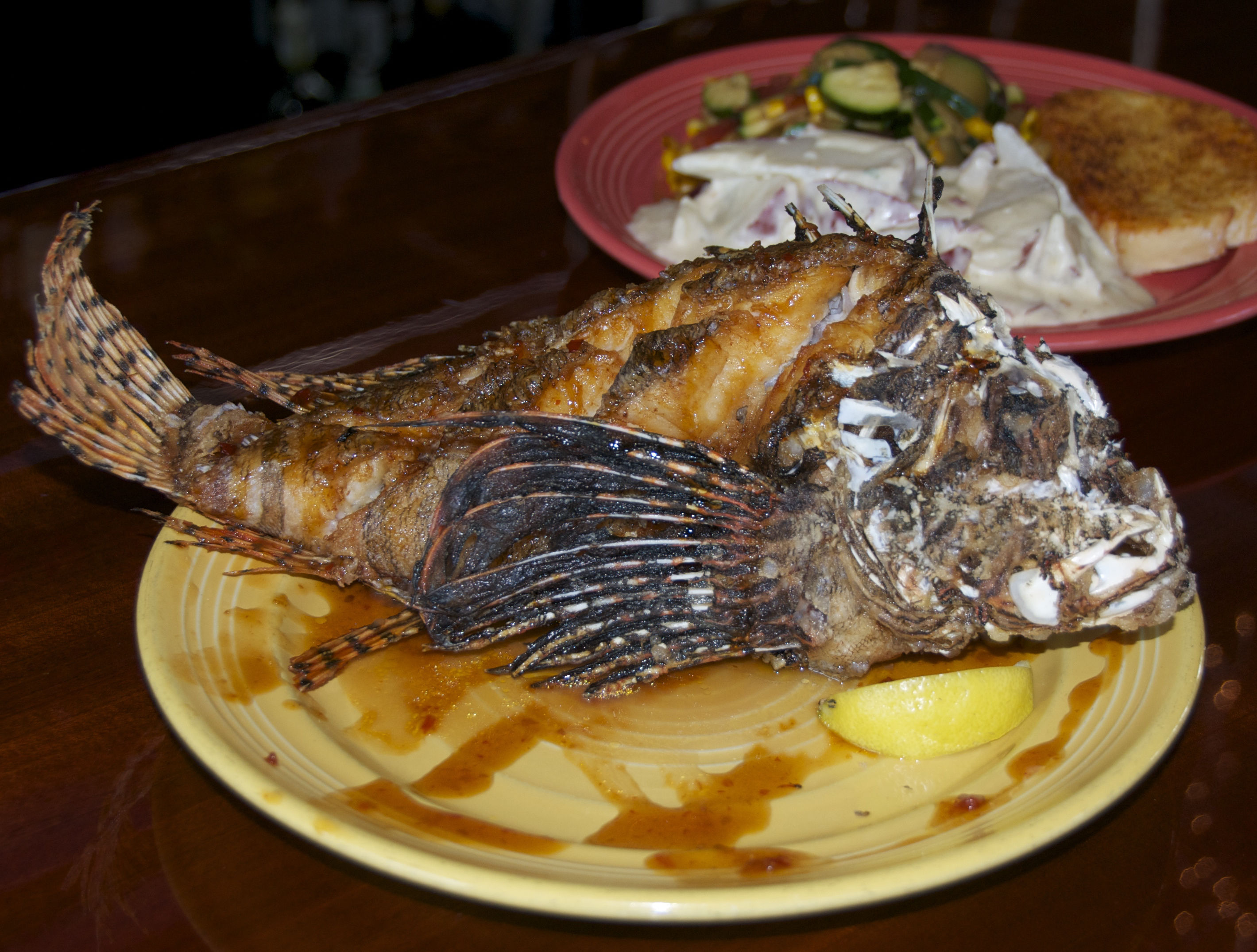Cocoa Beach, FL (Florida Today) -- For years, Cocoa Beach's legendary Bernard's Surf was known for an exotic menu featuring zebra steak, giraffe, chocolate-covered ants and fried bees.
Over the years, the popular palate has shied away from such exotic fare. But at least one Brevard County eatery is dipping its toes back into the exotic waters — courtesy of an unwelcome visitor from the Indo-Pacific.
Grill's Seafood is working with local commercial divers to stoke the demand for lionfish — the white-fleshed, mild-tasting invasive species that 10 years ago was more likely to be seen in a saltwater aquarium than on a dinner plate.
Popular lore has it that the fish were introduced from a damaged home aquarium on Biscayne Bay during Hurricane Andrew. According to scientists, however, the more likely scenario involves releases by aquarium owners who couldn't care for mature fish.
Over the past 25 years, lionfish have established themselves from Venezuela to the Carolinas, posing a significant threat to native species and fisheries. As of yet, nothing in the Atlantic or Caribbean has decided they make a good meal.
Except for humans.
That's a containment method state officials and enterprising commercial fishermen are banking on. Last week, the Florida Fish and Wildlife Conservation Commission designated the Saturday following Mother's Day each year as Florida Lionfish Awareness and Removal Day.
Thanks to increased interest, more commercial divers — like Brevard native and 30-year commercial veteran Andy Fish — are looking to the lionfish as a gap-filler thanks to a lack of size or bag limits.
"We can't catch snapper anymore, and grouper seasons are becoming more restrictive," says Fish, who operates the custom-built 38-foot Point Blank out of Sunrise Marina. "We started looking at lionfish as an add-on; we see them on every dive, on every spot. They're everywhere. And now, the price is starting to get right. And they taste good."
Fish supplied Grill's Portside with more than 200 pounds of the spiny creatures last week, averaging a pound each. Grill's owner Joe Penovich and general manager Chris Herrnkind decided it was time to put them on the menu.
So far, it's been a big hit.
"We'll probably go through what we bought in the next day or two," Herrnkind says. "We're serving the fish fried whole, like you would a yellowtail snapper, but finish it under a broiler with a Teriyaki glaze. The response has been tremendous."
Herrnkind said the yield per fish isn't great enough to make ceviche or sashimi commercially viable. But whole fish in the pound- to pound-and-a-half range make a fine dinner, retailing for between $20 and $30 with two sides.
New target
Recreational divers are beginning to hunt lionfish as well. The fish's abundance and lack of fear make it a perfect target.
"They're pretty easy to shoot," Fish says. "Anybody that can pull back on a rubber band and hold a regulator in their mouth can shoot one."
To hunt them, Fish recommends several critical items. First is a pole spear equipped with a paralyzer tip — a three-prong head that immobilizes the target on impact. Divers also require a set of puncture-proof gloves and sturdy shears. Although they aren't poisonous like a puffer fish, the elongated dorsal spines are venomous and deliver a powerful sting. Once on the spear, it's an easy matter to trim the spines, rendering them harmless. You'll also need a puncture-proof container.
"I've used the bags, but they really don't work that well," Fish says. "The best thing I've seen is the ZooKeeper, manufactured in Sarasota. With that type of unit, you can spear them and stuff them in the container and get on to the next one without even worrying about trimming the fins — you can do that later. That makes a difference when you're trying to kill a bunch of them."
New market
Lionfish are fast becoming popular in markets and restaurants across Florida and along the Eastern Seaboard, according to Seafood Atlantic owner Jim Busse, at Port Canaveral.
"We deal in a couple hundred pounds a week," Busse says. "It's a high-quality product, but very weather-dependent and most of the professional divers are looking for more traditional high-dollar fish. But the quality is exceptional. I just wish the state was doing more to address the lionfish problem. Right now, they're just taking small bites out of a bigger problem."
One of the high points for recreational divers is that lionfish are the exception to the rule — all that's needed is a basic Florida Saltwater Products license. It's easy — and legal — for the weekend warrior to subsidize dives by harvesting and selling lionfish.
Busse says he'll buy them from anyone who has the required permit, as long as they weigh more than 3/4-pound gutted and the spines are trimmed. Currently, market price to fishermen is running about $4 to $4.50 per pound.
And that's a nice side of cabbage to go with a (nuisance) fish dinner.
Ted Lund is a freelance writer and photographer born and raised on the Space Coast. Email him at floridatodayoutdoors@gmail.com or visit tedlund.com.
More on lionfish
•The most comprehensive lionfish resource online, including how to capture, clean and cook lionfish is available at REEF.org.
•For more on Florida Lionfish Awareness and Removal Day or to download Florida's new lionfish app, visit MyFWC.com/lionfish.
•To learn how to catch them or what equipment you need, visit Sunrise Marina at Port Canaveral or log on to zkstore.com.


